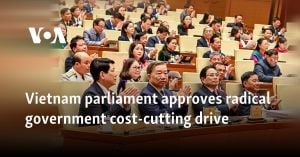Andrea Delmastro Delle Vedove, the Undersecretary of Justice of Italy’s ruling Fratelli d’Italia party, was sentenced to eight months in prison by the Rome court on Thursday, February 20, 2023, for disclosing state secrets concerning anarchist Alfredo Cospito. The ruling came as the court concluded he had relayed confidential information protected by secrecy laws during parliamentary proceedings, stirring intense political reactions across the spectrum.
The conviction stems from events occurring on February 31, 2023, when Giovanni Donzelli, Delmastro’s party colleague, presented information to the Chamber of Deputies about conversations intercepted during Cospito’s time at the Sassari prison. Cospito, held under the harsh 41-bis regime, was engaged in conversations with other prisoners, some of whom were linked to organized crime. This material was provided to Donzelli by Delmastro, who had received it from officials at the Department of Penitentiary Administration (DAP).
During his presentation, Donzelli controversially linked the information to inquiries made by Democratic Party (PD) parliamentarians who visited Cospito to assess his health amid his hunger strike protest against the regime. The resulting accusations from Donzelli suggested complicity of leftist elements with values alien to the State, which provoked political backlash.
Despite notions raised during the proceedings questioning the intent behind Delmastro’s disclosures, the courtroom deliberations opened with the prosecution arguing for acquittal, citing insufficient proof of knowing wrongdoing on his part. Prosecutor Paolo Ielo stated Delmastro did not appear aware of the classification status of the shared information.
Reacting to the verdict, Delmastro declared, "I hope there is a judge in Berlin but I will not resign," indicating his belief the judgment was politically motivated, referencing Bertolt Brecht's famed play where the ideal of impartial justice is called upon. Prime Minister Giorgia Meloni expressed her shock and discontent, questioning whether the judgment was fundamentally sound and insisting Delmastro would remain in his position.
Opposition parties have been unyielding, demanding Delmastro's resignation from numerous fronts. Elly Schlein, the PD secretary, openly called for Meloni to dismiss him. Meanwhile, Matteo Renzi of Italia Viva referred to Delmastro’s ability to serve as undersecretary as compromised long before the conviction, criticizing the government’s handling of this situation.
Meloni's government has positioned itself firmly behind Delmastro, with Justice Minister Carlo Nordio expressing disorientation and sadness over the conviction yet reaffirming his confidence and support for Delmastro, emphasizing their continued collaboration on necessary reforms.
Political fallout continued as various factions argued about the ramifications of Delmastro's actions. While coalition partners defended him, opposition figures highlighted the peril inherent in government officials leveraging sensitive information for political gain.
The case also raised broader concerns about the sanctity of state secrets and the integrity of parliamentary dialogue. With the A.V.S. (Alleanza Verdi-Sinistra) deputy Angelo Bonelli pointing out the alarming trend of exploiting political power to undermine institutional respect, the incident ushered intense scrutiny on both the actions of Delmastro and the governmental response.
Opposition leaders like Giuseppe Conte of Movimento 5 Stelle condemned the entire situation as indicative of systemic failures within the current government framework, stoking fears of politicized justice. With intensified rhetoric surrounding accountability, the stage is set for Delmastro's appeal against the conviction—a move he has signaled intentions to pursue without hesitation.
This saga exemplifies the volatile intersection of political power, judicial independence, and media dynamics, as the implicated parties navigate the storm of accountability intertwined with public perception. The complexity lies not just within the actions of individuals but also the broader political narrative and its impacts on the societal trust and workings of Italy’s governing structures moving forward.
Now, with Delmastro’s positioning under scrutiny, future political maneuvers from both governmental and opposition sides may define the next chapters of public trust and institutional integrity. The repercussions from this situation will likely resonate throughout Italy, perhaps influencing legislative frameworks and public accountability protocols within governmental spheres.



